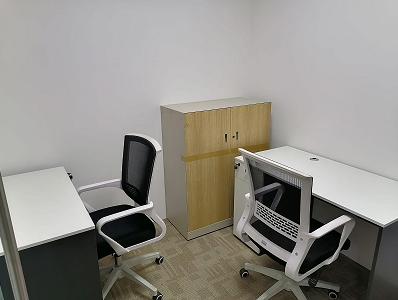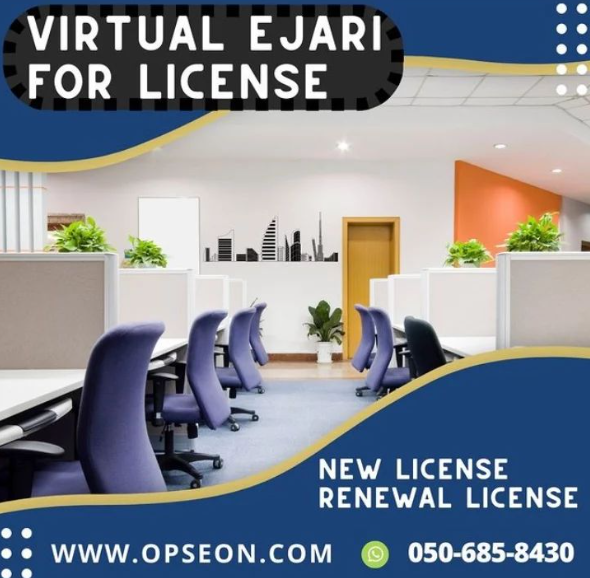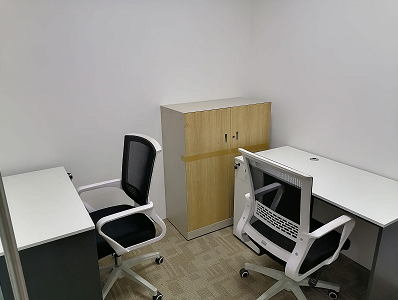The Rise of Virtual Offices in UAE

Blog Details
The Rise of Virtual Offices in UAE
In today's fast-paced and technologically-driven world, the traditional concept of a physical office is fast becoming a thing of the past. Enter the era of virtual offices - a trend that is revolutionizing the way we work.
With remote work on the rise and businesses embracing more flexible models, virtual offices offer a myriad of benefits for both employees and employers alike. Gone are the days of long commutes, rigid office hours, and expensive leases. Instead, workers can now enjoy the freedom to work from anywhere, at any time, all while maintaining a professional presence.
The rise of virtual offices in dubai UAE has been accelerated by advancements in communication technology, enabling seamless collaboration, effective project management, and easy access to resources. Teams can connect and collaborate through video conferences, virtual whiteboards, and shared documents, fostering productivity and creativity.
Not only do virtual offices in dubai provide flexibility and cost savings, but they also contribute to a better work-life balance, increased employee satisfaction, and access to a global talent pool. As more companies embrace this futuristic way of working, the virtual office is poised to become the new norm, transforming the future of work as we know it.
Advantages of Virtual Offices
Virtual offices from opseon offer numerous advantages over traditional office spaces. Firstly, they eliminate the need for expensive leases and overhead costs associated with maintaining a physical office. This cost-saving measure allows businesses to allocate resources more efficiently, investing in areas that directly impact growth and innovation.Secondly, virtual offices provide unparalleled flexibility. Employees have the freedom to work from anywhere, be it their home, a coffee shop, or a co-working space. This eliminates the need for long commutes and allows individuals to create their ideal work environment, leading to increased productivity and job satisfaction.
Another advantage is access to a global talent pool. With virtual offices, geographical boundaries are no longer a limitation. Businesses can hire the best talent from around the world, bringing together diverse perspectives and expertise. This not only enhances creativity and problem-solving but also opens up new market opportunities.
Furthermore, virtual offices contribute to a better work-life balance. Employees have the flexibility to set their own schedules, allowing them to prioritize personal commitments without sacrificing professional goals. This flexibility leads to reduced stress levels and higher job satisfaction, ultimately benefiting both the individual and the organization.
Challenges of Traditional Office Spaces
While traditional office spaces have been the norm for many years, they come with their fair share of challenges. One of the most significant drawbacks is the high cost of maintaining a physical office. Rent, utilities, furniture, and other expenses can quickly add up, especially for startups and small businesses with limited resources.
Additionally, commuting to and from the office can be time-consuming and stressful. Traffic congestion, public transportation delays, and long distances can eat up valuable hours that could be better spent on productive work or personal activities. This daily grind negatively impacts work-life balance and employee morale.
Another challenge is the limited access to a diverse talent pool. Traditional office spaces are often limited to a specific geographical location, making it difficult to attract and hire top talent from different parts of the world. This limitation hinders innovation and growth potential, as businesses miss out on the unique perspectives and skills that individuals from diverse backgrounds can bring.
Furthermore, the rigid structure of traditional offices can stifle creativity and productivity. Strict working hours, set schedules, and a lack of autonomy can create a monotonous and uninspiring work environment. Employees may feel constrained and less motivated, leading to decreased job satisfaction and subpar performance.
Technology and the Rise of Remote Work
The rise of virtual offices can be largely attributed to advancements in communication technology. With the advent of high-speed internet, cloud computing, and video conferencing solutions, remote work has become more accessible and efficient than ever before.
Collaboration tools such as Slack, Microsoft Teams, and Google Drive enable teams to communicate, share files, and work on projects together, regardless of their physical location. Video conferencing platforms like Zoom and Skype facilitate face-to-face meetings, fostering a sense of connection and collaboration even when team members are miles apart.
Cloud-based project management tools such as Trello, Asana, and Basecamp allow teams to track progress, assign tasks, and manage deadlines in real-time. These tools streamline workflows and ensure that everyone is on the same page, regardless of their physical location.
Additionally, virtual whiteboards and screen sharing capabilities enhance brainstorming sessions and collaborative problem-solving, replicating the experience of being in a physical office.
The combination of these technological advancements has made remote work not only possible but also highly efficient and productive. It has paved the way for the rise of virtual offices, enabling businesses and individuals to embrace a new way of working that prioritizes flexibility, collaboration, and results.
How Virtual Offices Work
Virtual offices operate on the principle of providing businesses with a professional address and a range of services without the need for a physical presence. They offer a variety of solutions tailored to the specific needs of each business, ensuring that they can maintain a professional image and access essential resources.
A key component of virtual offices is the provision of a prestigious business address. This address can be used for official business correspondence, marketing materials, and client communications. Virtual office providers typically offer a range of address options, including prestigious locations in major cities, giving businesses the credibility and visibility they need to succeed.
Additionally, virtual offices often include mail handling services. This means that businesses can have their mail and packages received and forwarded to them, regardless of their physical location. This ensures that important documents and communications are not missed, even when employees are working remotely.
Virtual office solutions also extend to phone services. Many providers offer virtual receptionist services, where calls are answered in a professional manner and forwarded to the appropriate individuals or departments. This gives businesses the advantage of a dedicated phone line without the need for physical phone systems or on-site staff.
Furthermore, virtual offices may offer access to meeting rooms and conference facilities on an as-needed basis. This allows businesses to hold in-person meetings, presentations, and client consultations when necessary, without the need for a permanent physical space.
Overall, opseon virtual offices provide a comprehensive range of services that cater to the needs of modern businesses. They offer the flexibility, professionalism, and resources required to thrive in an increasingly digital and globalized world.
Virtual Office Solutions and Services
When considering a virtual office, it is essential to choose a provider that offers the right solutions and services to meet your specific business needs. Here are some key factors to consider when selecting a virtual office provider:
1. Location: Look for providers that offer prestigious business addresses in desirable locations. This will give your business credibility and help attract clients and customers.
2. Mail Handling: Ensure that the provider offers reliable mail handling services, including mail forwarding, scanning, and notification. This will ensure that you never miss important correspondence and can access documents regardless of your location.
3. Phone Services: Consider whether you require virtual receptionist services or a dedicated phone line. Look for providers that offer professional call handling and forwarding options, ensuring that your business calls are handled in a professional manner.
4. Meeting Spaces: If you anticipate the need for in-person meetings or presentations, choose a provider that offers access to well-equipped meeting rooms and conference facilities on a flexible basis.
5. Additional Services: Some virtual office providers offer additional services such as virtual assistants, administrative support, and IT services. Assess your business needs and determine if these additional services would be beneficial.
By carefully evaluating these factors and selecting a reputable and reliable virtual office provider, you can ensure that your business has the necessary tools and support to thrive in the virtual workspace.
Choosing the Right Virtual Office Provider
When choosing a virtual office provider, it is crucial to consider your specific business requirements and goals. Here are some key factors to consider:
1. Reputation: Research the provider's reputation and read reviews from other businesses that have used their services. Look for a provider with a track record of reliability, professionalism, and excellent customer service.
2. Pricing: Consider the pricing structure and packages offered by the provider. Ensure that they are transparent about their fees and that the services provided align with your budget and needs.
3. Flexibility: Assess the flexibility of the provider's services. Can you easily scale up or down as your business grows or changes? Look for providers that offer customizable packages and options to meet your evolving needs.
4. Technology Integration: Evaluate the provider's compatibility with your existing technology stack. Ensure that their communication and collaboration tools align with your preferences and are easy to integrate into your workflow.
5. Customer Support: Consider the level of customer support provided by the virtual office provider. Look for providers that offer responsive and knowledgeable support staff who can assist you with any issues or concerns that may arise.
Taking the time to thoroughly research and select a reputable virtual office provider will ensure that you have a strong foundation for success in the virtual workspace, allowing you to focus on growing your business and achieving your goals.
Case Studies: Successful Businesses Embracing Virtual Offices
Numerous successful businesses have already embraced virtual offices and reaped the benefits of this flexible and innovative way of working. Here are a few case studies that highlight the impact of virtual offices on these businesses:
1. Automattic: Automattic, the company behind WordPress.com, is a fully distributed company with no physical office. With over 1,000 employees located in different parts of the world, Automattic relies heavily on virtual office solutions to facilitate communication, collaboration, and project management. This virtual setup allows them to tap into a global talent pool and operate efficiently at scale.
2. Buffer: Buffer, a social media management platform, is another company that operates with a virtual office model. With a team spread across multiple time zones, Buffer relies on virtual communication tools and project management platforms to ensure seamless collaboration and maintain a cohesive company culture. This virtual setup has allowed Buffer to attract top talent and scale their operations efficiently.
3. Toptal: Toptal, a global network of freelance software developers and designers, operates entirely remotely. With a distributed team spanning over 100 countries, Toptal leverages virtual office solutions to connect freelancers with clients, facilitate communication, and ensure a seamless project workflow. This virtual setup has enabled Toptal to build a strong network of highly skilled professionals without the constraints of a physical office.
These case studies demonstrate how virtual offices can enable businesses to thrive in a digital and globalized world. By embracing this flexible way of working, these companies have been able to attract top talent, increase productivity, and achieve remarkable success.
Tips for Managing a Virtual Team
Managing a virtual team comes with its unique set of challenges. Here are some tips to help you effectively manage your virtual team and maximize productivity:
1. Establish Clear Communication Channels: Ensure that your team has access to reliable communication channels and establish clear guidelines for communication. Regularly check in with team members to provide guidance, address concerns, and foster a sense of connection and collaboration.
2. Set Clear Expectations and Goals: Clearly communicate expectations, deadlines, and goals to your team members. Provide them with the necessary resources and support to achieve these goals and regularly assess progress to ensure alignment.
3. Leverage Technology Tools: Take advantage of technology tools that facilitate collaboration, project management, and communication. Explore different tools and find the ones that work best for your team's needs.
Promote Team Building and Engagement: Foster a sense of community and team spirit by organizing virtual team-building activities, celebrations, and social events. Encourage open communication and provide opportunities for team members to share ideas and feedback.
5. Trust and Empower Your Team: Trust your team members to deliver high-quality work and empower them to make decisions and take ownership of their projects. Provide support and guidance when needed, but also allow them the autonomy to work independently.
By implementing these tips, you can effectively manage your virtual team, foster a positive and productive work environment, and achieve your business objectives.
Conclusion: Embracing the Future of Work with Virtual Offices
The rise of virtual offices represents a paradigm shift in the way we work. With advancements in technology and the increasing demand for flexibility, virtual offices from opseon offer a range of benefits for businesses and individuals alike.
From cost savings and increased productivity to access to a global talent pool and improved work-life balance, the advantages of virtual offices are undeniable. As more companies embrace this futuristic way of working, the virtual office is set to become the new norm, transforming the future of work as we know it.
By choosing the right virtual office provider, leveraging technology tools, and effectively managing virtual teams, businesses can thrive in a digital and globalized world. Embracing the future of work with virtual offices is not only a smart business move but also a step towards creating a more flexible, inclusive, and fulfilling work environment for all.





























































































































































































































































